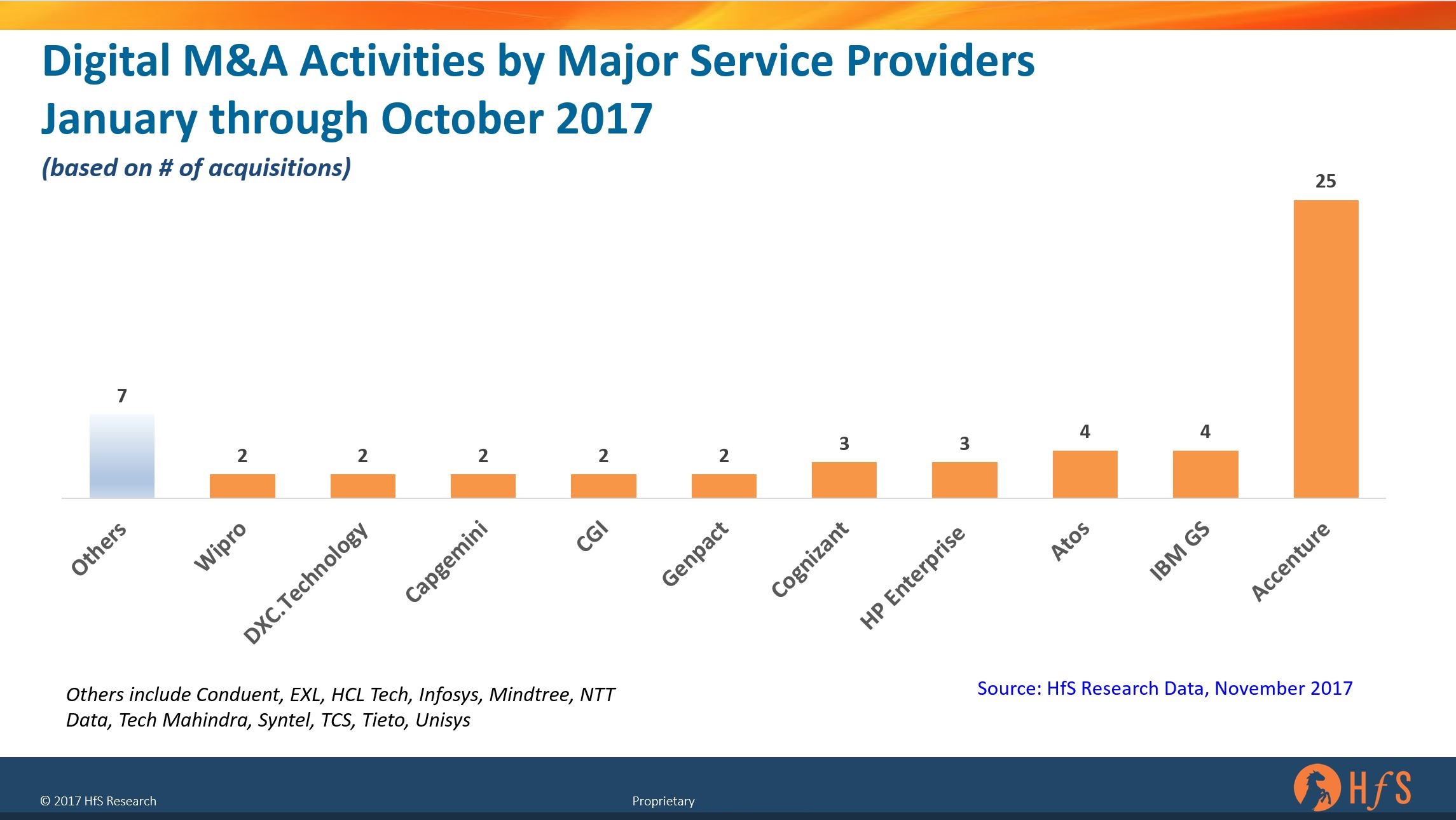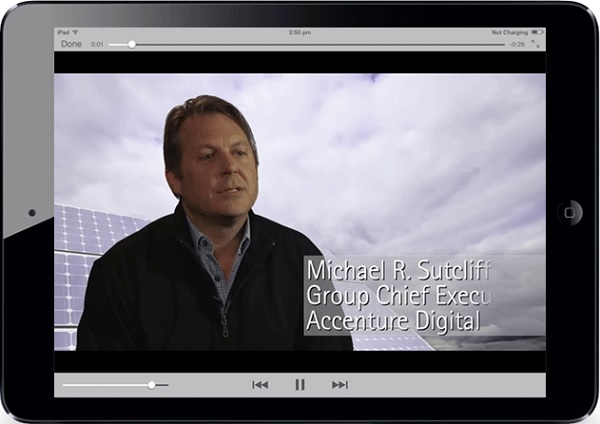Accenture’s strategy has always been pretty straight-forward: focusing on its major clients and making sure it stays ahead of the pack, where the marketing is moving. This was pretty much the story when we spoke with Accenture Digital’s Group Chief Executive, Mike Sutcliff, two and a half years ago (view blog)… and today all these intentions have been backed up by billions of dollars of bold digital investments, vastly outplaying the competition:
So we hunted Mike down for an update to talk about these massive recent investments and how this Accenture Digital business is shaping up…
Phil Fersht, CEO and Chief Analyst, HfS Research: Good morning Mike – it’s been a couple of years since we first discussed the big digital push your firm is making. Can you share an overview of how the market has evolved since then?
Mike Sutcliffe, Group Chief Executive, Accenture Digital: Sure Phil. Thank you for having me. I guess the first thing I would note is that companies started thinking about digital as a channel or a technology, and then they started to understand that they had to design omnichannel customer experiences. They really started to think about how the digital channels and physical channels blended together.
But what’s happened in the past two years is they’ve started to understand that this is about the entire business model, the operating practices, the business processes, the organization and skills. Not just in the front office but the mid and back office. They are re-architecting their businesses to create fundamentally better experiences that scale across front, mid and back-office operations.
Phil: Do you feel the confusion has lifted around digital? Are clients more certain, now, of where they are going, when it comes to digital strategy?
Mike: I think most clients have really started to understand what the predictable disruption would look like in their industry. They have made choices on whether they want to become the disruptor or be a fast follower. They have started to think about what their roadmap is going to be as they chart out the course of creating, or depending on, new revenue streams in their businesses. The question though is no longer just “what should I do” but “how do I get it done”.
Phil: We’ve talked a lot in general about digital disruption and how traditional businesses are going to get wiped off the face of the planet if they don’t wake up and smell the roses. However, our recent research clearly shows a lot more organizational leadership today is far more bullish about opportunities than threats when it comes to digital impact on their business environments. Do you think traditional firms have figured this out? And who do you see as leading, and lagging, in your experience, when you look at different industries?
Mike: Well I do believe that most of the players in each of the different industry segments we participate in have understood what the disruptors might be. They have looked at what the start-ups are doing and what they are doing and then started to think about what assets and capabilities they have got, in order to give them an ability to win.
Now when they look at their financial flexibility and strength, their customer relationships, their brands, their knowledge, the constraints they are up against in the industry, they have decided that they have every right to innovate and create the next generation of the industry as well. We started with the consumer-facing industries like retail and consumer products, retail financial services, communications and hi-tech. But now we’ve seen that expand across all the industry groups, even the asset-intensive industries that are dealing with comprehensive disruption, where their ongoing business models are slowly degrading, they have started to really engage in what the right digital strategy is going to look like for their industry as it continues to rotate.
I would summarise by saying most of our clients understand what’s happening. They understand what they intend to do about it and now they are thinking about how quickly they move and how they pay for all this.
Phil: So tell us about this aggressive Accenture strategy, Mike. I think you’ve bought at least 20 digital agencies in the last 2-3 years and several other related firms that drive the digital paradigm. What is the grand plan here? Is it to integrate them all together under one common strategy, or are you trying to keep their cultures distinct, and perhaps take more time to see how this industry plays out? What’s the thinking here?
Mike: Well the first thing is that we are not trying to replicate the model of the agencies that do advertising and marketing work. In fact, we are not even really trying to go after the advertising and marketing market itself.
What we are trying to do is to create a single integrated capability, ‘Accenture Interactive’ that operates as an experienced agency. Their job is to design and create the best experiences in the world not just for consumers but for employees, for physicians, for participants in sporting events. What we really want to do is find a way to create better experiences at scale. In order to do that we need many of the skills in e-commerce and contact management and experience design in executing digital marketing campaigns that the agencies would have had traditionally. So what we have been doing is creating a combination of capability from creatives to content to commerce, experience design etc., bringing them into an integrated team at Accenture Interactive, but at the same time respecting the fact that their cultures might differ in terms of the tools, the techniques, the approaches they used to get the work done.
And what we really focused on is making sure that the cultures are all aligned to a core set of values that we’ve got about creating values for our clients as our primary objective and then doing whatever it takes internally to get the team together to make that happen.
Phil: As you look at the experience you’ve had in the last 2-3 years, meshing traditional consulting with these creative types, do you think you have found the secret sauce, or has this been more challenging than even you had envisioned?
Mike: We’ve discovered that the participants in the existing advertising and marketing world were watching the customer expectations evolve and they knew the model that they were working with was not going to be capable of satisfying the demands of their customers.
What we came to the industry with was just a different point of view on how to string together different types of skills and capabilities to serve those customer’s needs. We found that we are in the creative space because we have to be to serve the customer’s needs. The same thing with content, commerce and experience design. As we think about building Accenture Interactive, what we are really doing is appealing to the same objectives that those people have when they started their careers. They want to do great work for clients. We just take maybe a broader view of what it is going to take to do that work.
Phil: I think you already said you are not, but can you ever see Accenture becoming an advertising firm? I know folks in media who are already looking for jobs in Accenture. Clearly, digital media and advertising are merging. I mean do you think it is a possibility in the future?
Mike: No, I don’t. I think it’s absolutely the case that we will be creating products for clients that the advertising industry would call creative work. We are already doing that. It will absolutely be true that we will be either teaching our clients how to buy media and execute their own campaigns. We are doing some of that work on their behalf as part of a broader assignment. So I am not saying that we won’t be doing the work, but what we won’t be doing is trying to replicate the business model of the current advertising industry.
Phil: A very good answer, Mike… so disrupting the model in a different way =) What do you think we will be talking about in another two years? What do you think is going to become the dominant discussion in this digital sphere as we look at the development, the pace and the velocity of what’s been going on?
Mike: Well, Phil, we believe that all of this work in digital is about extending the capability of humans to do what humans are uniquely capable of doing. So I think we are going to be talking about how artificial technologies and immersive virtual and mix reality technologies can come together to enable humans to do the things that they do uniquely well.
We want to make sure that everything that we are working on is either creating a better experience for somebody or enabling somebody to do their job in a much richer way. I think that’s where the industry is headed, but there is lots of work to do to get there.
Phil: I think you once famously said to me “the future of work is going to be no work.” Do you still believe that’s the case?
Mike: Well I believe we will automate away a lot of the what I would call low-value work that humans are required to do today. But I think we will shift that energy to doing things that we don’t do today. I believe that humans will always be engaged in work but I think we will eliminate a lot of the non-value added things that we do today because we can let the technology handle that for us.
Phil: Thanks for your time today Mike – will be good so air your experiences again with our readers!
Posted in : Digital Transformation








Fantastic interview. Great peek into the thinking of this awesome company. Thanks for conducting & sharing with us Phil.
Excellent read !!! Thanks Phil ….
G’day Phil
Having worked at this great firm, Mike and Accenture are onto something great. I had first hand experience of a strategy well executed. In contrary, I didn’t see or experience the clarity at IBM. Now at Microsoft I can see how Satya is moulding the company to enable the platforms that support disruption.
Warm regards
Vijay